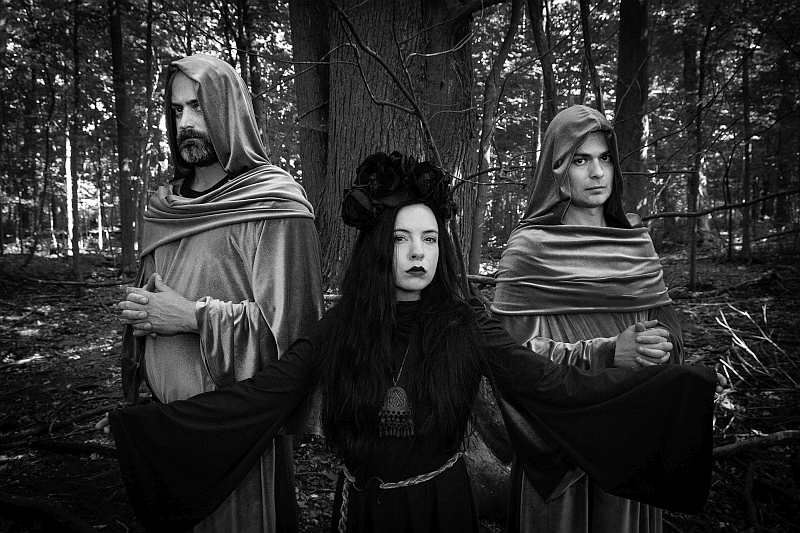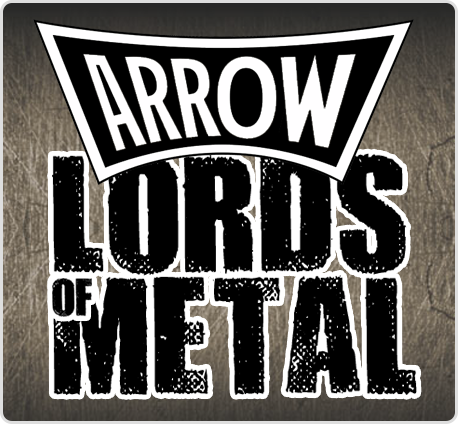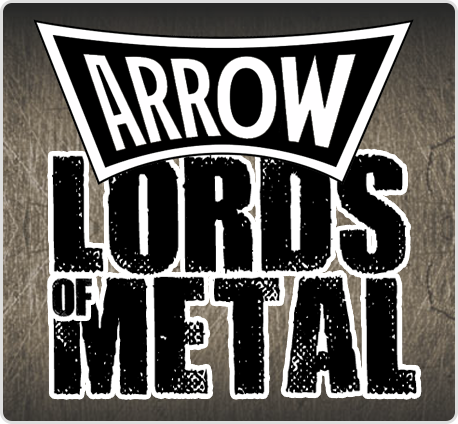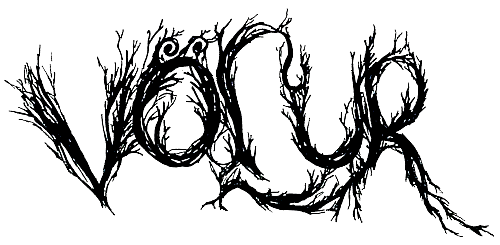
Lucas Gadke: “If you have the full world of music around you, why not use all styles and all methods?”
Reeds van in het begin – met het debuutalbum ‘Disir’ en de opvolger ‘Ancestors’ – was het al overduidelijk dat Volur geen gewone band was. Geen traditionele gitaren te bemerken in hun bezetting, wel zinderende basklanken, experimentele viool en mokerslagen van drums. De loodzware doom metal – verrijkt met enige folk elementen – heeft nu een derde thuishaven gevonden op het nieuwe album ‘Death Cult’. We trokken bij wijze van spreken naar de Canadese wouden om zanger/bassist, maar vooral bezieler Lucas Gadke uit te horen over zijn nieuwste creatie.
Vera Matthijssens Ι 23 november 2020
Hello Lucas, how are you doing? Now that Völur’s third album ‘Death Cult’ will be released soon, we’d like to do our second interview for Arrow Lords of Metal…
I’m doing good, excited to finally put out another full record. Since I last talked to you, we’ve put out a split LP and an EP but it feels different to make it a full-fledged record.
Let us first reflect on the previous album ‘Ancestors’ (2017). Did the reception of that album come up to your expectations and could you play enough gigs (when the world was still open) to support it?
We were very flattered and humbled by the positive response our record received. We were able to support it with a few American tours and connect with some wonderful folks there. Of course though, I’m never fully happy with the response to anything. A few more gigs, a few more listens online never hurts, but overall I’m proud of what we accomplished. What meant the most to me are the people who reached out to say that the music had touched them in a special way.
I remember, when we talked previously in September 2016, that you were already thinking about writing this third album. What came out of that intention and how do you look back at the creation of the backbone for ‘Death Cult’?
I’ve said often in interviews that I’ve been planning this tetralogy for a long time and that the themes and music were planned out. But to be fair, ‚Death Cult‘ was the least pre-meditated and went through the most changes since its inception. We have one more record in this group of four to make and that’s basically half written, but this one only had ‚Freyjan Death Cult‘ completed, which is a song we’ve been playing since at least 2017. Each album in the cycle is supposed to be about a different world in Northern Mythology. The first, ‚Disir‘, is about women, ‚Ancestors‘ about men and this, is of the world of gods. But when I came to actually write the album, I had a hard time finding inspiration in the world of Wagnerian archetypes and lofty one-eyed wizards riding on steeds (although that stuff is still pretty cool). So I took a more anthropocentric view of the subject and created something more in line with where I was at musically and mentally at the moment
‘Death Cult’ happens to be the third album inspired by Germanic spiritual issues and paganism. Can you go deeper into the subject of the specific ritual which was the main source of inspiration?
Yeah, so throughout 2018 and 2019 I was turning away from the old poems and eddas, and getting more into weird and more obscure writings. I went back and reread Tacitus’s Germania, one of the earliest attempts at an ethnography. I’d read it about a decade earlier when I was just getting into Germanic and European myths. Reading it again, with a more critical lens, I was struck by the authority that he spoke with on these distant people. But we now know he had a genuine lack of first-hand knowledge of most of his subjects. So most of it was hearsay or even rumour, or made by his imagination. This got me thinking about the power of writing that’s kind of unclear and the places the mind goes when it’s left to flights of fancy. Regardless, there’s a short passage which describes a ritual practiced by a large group of tribes centred on an idol of the earth goddess Nerthus. On a special day in a grove by a secluded lake, the idol is said to be cleaned by four slaves and then those very same slaves are said to be ritually drowned. This is such a bizarre and opaque thing that receives somewhere around ten lines of writing, but it captivated my mind for over two years. And I decided to do as Tacitus did and let my mind go off into flights of fancy. Perhaps the ritual is at night, maybe on the full moon, perhaps it has taken place across millennia, perhaps it never quite ends. Perhaps it accomplishes what they wish (peace with Mother Nature) or perhaps it does nothing at all.
Can we see ‘Death Cult’ as a lament, for persons and/or for the world?
‚Death Cult‘ is definitely a lament for the world and a lament for how we try and do well by our earth. It’s no secret that “the earth” is suffering, that we’re poisoning our rivers and lakes and leaving mass segments of the land to burn. We all know it’s bad and yet we don’t do enough.
In that respect it is said that this will probably be the closest you get to a kind of political awareness in your art. Can you tell a bit more about that?
Yes, we’ve never thought of Volur as being a political band, but when you talk about the environment, you have to talk about politics. The story in my mind goes: We have left behind the goddess of earth for the god of ash (who is referenced in the first single), the god of what we extract from the earth and burn for industry. Yet some of us still cling to the worship of mother earth, but it does nothing to stem the tide. We go through these elaborate rituals to absolve ourselves of the guilt of our relentless hunger for resources and profit, but nothing ultimately happens. Of course, nothing is a perfect allegory, I don’t believe that environmentalists are sacrificing people to lake gods, but it’s a meditation on the nature of ritual, of absolving sin and what it means to do performative things not in a vacuum, but when there are real consequences we know about. If ancient peoples had a plague, they would ask the gods to help. We know now that this does nothing. But they did not, so they were doing all they could. We have a disaster that we’re on the brink of, and we know how to solve it, but we do not. We do little showy things like buying a biodegradable cup or buying a carbon offset, little green indulgences, but they do nothing.
The album consists of four extensive tracks. Is it built up during physical rehearsals or do you sometimes work from a distance with files and things like that?
We work together and in person. The way we like to work is to arrive together with an incomplete idea and to work on an arrangement or a piece as a group. Often I will write a riff or a chord progression and ask Laura to come up with a melody or counter melody. We actually really like jamming and we’ve definitely brought more elements of improvisation into this record.
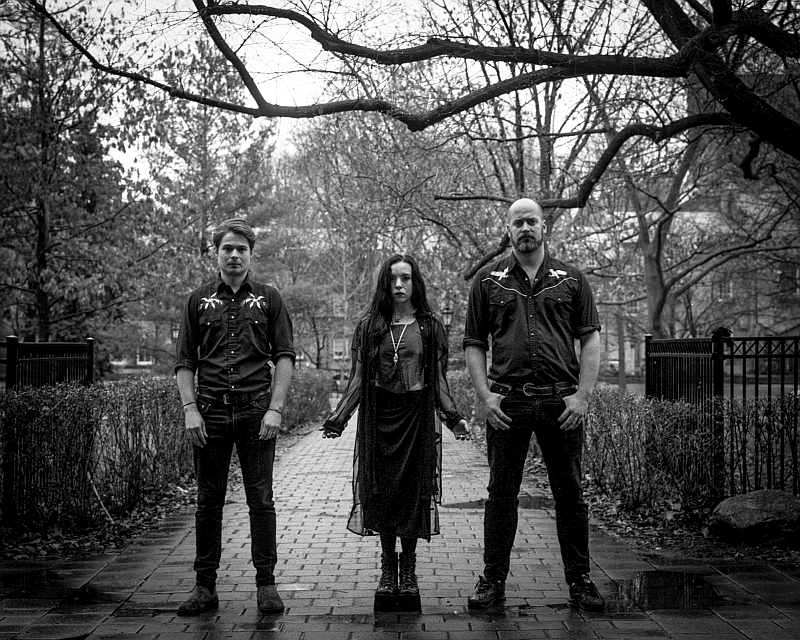
One of the songs I would like to hear some more details of, more precisely ‘Freyjan Death Cult’, it seems to be like a main track, the summary of everything or not?
It definitely set the vibe for the rest of the album. Believe it or not, most of the songs on this album are shorter than what we did for ‚Ancestors‘. We wanted to make this album feel “tighter” while not giving up any of the genre mixing and experimentation in the first record. ‚Freyjan Death Cult‘ is probably the longest and most diverse track. Thinking of it as a summary, all of the tracks have basically different variations of the same lyrics, they all tell mostly the same story, just in different times and places. I had in my mind the story of a ritual that started and never seemed to end. A night that went on for seven years. ‚Freyjan Death Cult‘ has elements of doom, free jazz, black metal and Fairport Convention. We got our dear friend John David Williams to do a free improv duet with Laura on the bass clarinet, in a tribute to Eric Dolphy, who is one of the patron saints of the band. If you haven’t listened to Dophy I advise you check him out immediately.
Last time we spoke you were about to embark to Europe for the Prophecy Fest. Well, now it would be great to hear: how did you experience this concert in a cave and being in Germany? Did you have time to explore nature in that environment?
Playing in that cave was one of the highlights of my life, an incredible moment, what sound, what a feeling of beautiful community. We took a trip up to Essen and then to Bonn and explored a little bit there. I’ve been to Germany several times to play with my other band, Blood Ceremony, but admittedly have never gotten to explore it as much as I’d like, especially nature. My dream is to one day visit Thuringia and explore the “green heart of Germany.”
Concerning the vocals on this album: they are even more diverse and very intense. Do you still use wordless parts or did you prefer to use proper lyrics this time?
I think we have a few parts that are chanting vocals, and we won’t stop using them in the near future, but there are way more lyrics in this one, especially because I had something to say! Laura is doing more harsh singing on this one, which really opens up the pallet, she does an amazing job on ‚Dead Moon‘, which I think came across beautifully.
I guess your hunger for Norse mythology is an ongoing interest. Which personal changes/upgrades/differences in approach did you experience at the level of spirituality during those last years?
Yes it’s something that I don’t imagine losing interest in any time soon. When I was writing ‚Ancestors‘ I was really interested in the sagas and now that has waned a little for me, now that I’ve read so many of them. So now I’m more interested in the research and archaeology and study of these things. My spirituality has some around to a strange place. I used to be interested in Asatru and the modern pagan movement, but I’ve moved away from it as my political and spiritual beliefs have become more solid. Those movements always talk about honouring their ancestors, but they seem to forget that the Vikings and ancient peoples are dozens of generations back. Our more recent and more connected ancestors were very different people. Mine were Mennonites. So I’ve done what I can to learn more about them and what they valued: peace, harmony and social justice. That’s where my mind has been recently. I still love the aesthetics, and I don’t think that will ever leave me, but I’m still less interested in Viking raids and thunder gods than I am in real people and the work they did to feed their families and live good lives in communities.
What can you tell about the making of the video clip for ‘Inviolate Grove’?
We originally filmed a live video in a studio but it was lacking something. We got in touch with our collaborator Sarah Legault who integrated mysterious footage from her work with the Shadowood Collective in London, Ontario. The idea was to present a “live video” but with imagined elements integrated into the footage that highlight some of the lyrical content. These hallucinatory elements are not designed to be chronological in any way, only to open the mind of the listener.
Are you (or the band) struck by the pandemic in your freedom/travelling/touring or is it all in all a time you will sail through easily since you do not live in a hectic town environment?
Well, until recently we all were living in Toronto which is Canada’s biggest and noisiest city! Justin, our drummer, has fled and moved southwest to London, Ontario, while Laura and I are still stuck in this bustling mayhem. I’m desperate to get out of Toronto and probably will do so in the next few months. I was not terribly affected by the pandemic as I’m a carpenter and even though our country was shut down, I was still permitted to work. But it definitely was a big shift to have no gigs at all, especially since I used to play jazz every Saturday. I played that gig for almost ten years! It’s been a bummer not to gig and a bummer to not be able to tour. I miss life on the road and I miss playing in front of people and doing those live stream things just isn’t the same.
What can you tell about the artwork?
Our wonderfully talented friend Marie Cherniy did the artwork for us. We gave her the passage from Tacitus and told her to let her imagination go wild. What we see is the idol of Nerthus coming to life below the full moon with a crown of trees and oxen. It’s a wonderfully detailed image that I’ve grown to like more and more every time I see it.
How would you describe ‘Death Cult’ in comparison with its predecessors?
‚Death Cult‘ is definitely tighter, more focused and more expansive at the same time. To quote Yngwie Malmsteen “more is more.” I wanted to have all the elements of free improvisation and full through composed music to be side by side. Outside of metal acts our biggest influencers are artists like Eric Dolphy, Albert Ayler and Charles Mingus, composers who had a very holistic view of music. Dolphy came through in our attention to free form improv whereas Mingus came in the form of a mixed approach to our compositions. If you have the full world of music around you, why not use all styles and all methods?
What are the plans for the near future?
Who has plans any more?? All kidding aside, we have a short EP that’s ready to be released, that just needs artwork and we are finishing up work on another EP. We are working on a series of self recorded EPs that are collaborations with different artists called “die Sprachen der Vogel” or “The languages of Birds.” We have already released two: ‚Psychopomp‘ and ‚Veiled City‘. ‚Psychopomp‘ was originally a cassette only single but now it and ‚Veiled City‘ are available on all platforms. ‚Veiled City‘ will be released on cassette soon as well.
If there is something you’d like to add, please feel free to do so…
Look for our new album ‚Death Cult‘, the pre-order is up right now on Prophecy Productions. Of course you can also check out or more recently released EPs ‚Veiled City‘ and ‚Psychopomp‘ which are up on Spotify, Apple Music and all other streaming services! If you enjoy the music, let us know!
